人教版英语八年级上册全册教材全解
人教版英语教材全解八年级
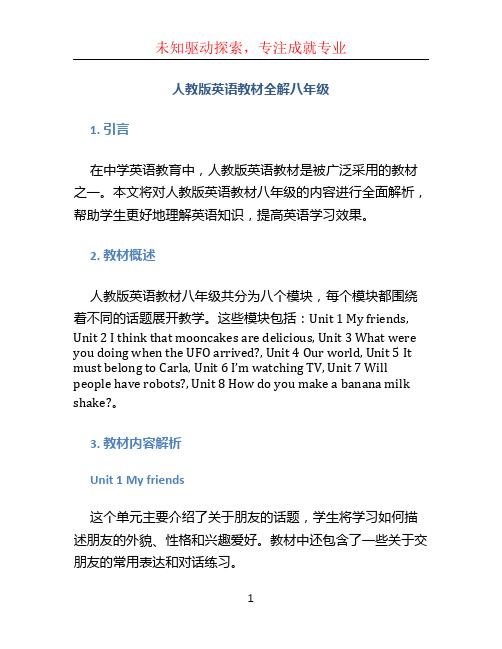
人教版英语教材全解八年级1. 引言在中学英语教育中,人教版英语教材是被广泛采用的教材之一。
本文将对人教版英语教材八年级的内容进行全面解析,帮助学生更好地理解英语知识,提高英语学习效果。
2. 教材概述人教版英语教材八年级共分为八个模块,每个模块都围绕着不同的话题展开教学。
这些模块包括:Unit 1 My friends, Unit 2 I think that mooncakes are delicious, Unit 3 What were you doing when the UFO arrived?, Unit 4 Our world, Unit 5 It must belong to Carla, Unit 6 I’m watching TV, Unit 7 Will people have robots?, Unit 8 How do you make a banana milk shake?。
3. 教材内容解析Unit 1 My friends这个单元主要介绍了关于朋友的话题,学生将学习如何描述朋友的外貌、性格和兴趣爱好。
教材中还包含了一些关于交朋友的常用表达和对话练习。
Unit 2 I think that mooncakes are delicious本单元的主题是中国的传统节日中秋节,学生将学习有关中秋节的传统和习俗,并且学习如何用英语表达自己对于中秋节和月饼的看法。
Unit 3 What were you doing when the UFO arrived?这个单元主要以时间和动作的过去进行时为重点,学生将学习描述过去正在进行的动作。
同时,教材中也包含了一些关于UFO的知识介绍,以增加学生的兴趣。
Unit 4 Our world本单元将介绍地理知识和自然灾害的相关话题。
学生将学习如何描述世界各地的地理位置、特色以及过去的自然灾害。
Unit 5 It must belong to Carla这个单元主要学习推测和猜测的表达方式。
人教版英语八年级上册全册教材全解

人教版英语八年级上册Unit 10 If you go to the party,you'll have a greattime!教材全解【教材内容解析】Section A1.If you go to the party, you'll have a great time。
(P. 73)have a great time意为“过得愉快、玩得开心”,相当于enjoy oneself或者have fun。
They are having a great time in the park.=They are enjoying themselves in the park。
2. The students are talking about when to have a class party/a class meeting/a birthday party. (P。
74)have a class meeting意为“开班会"。
We will have a class meeting next week.3。
What will Mark organize?(P。
74)organize用作及物动词,表示“组织、安排”,后接表示组织、活动类的名词做宾语,名词形式为organization表示“组织”.Last month, we organized a party。
4.。
let’s order food from a restaurant。
(P。
74)order此处表示“订购、点菜”,order sth. from。
.。
表示“从……订购某物"。
I ordered some chicken from that shop。
【拓展】order还可以作及物动词,意为“命令”,表示“命令”时,常用于order sb。
(not) to do sth。
结构中The police ordered him to wait right here。
最新人教版八年级英语(上)教材全解Unit1-3名师优秀教案
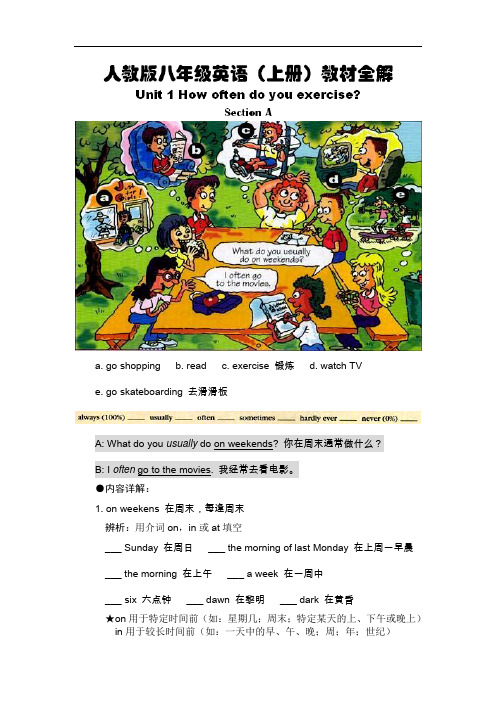
a. go shoppingb. readc. exercise 锻炼d. watch TVe. go skateboarding 去滑滑板●内容详解:1. on weekens 在周末,每逢周末辨析:用介词on,in或at填空___ Sunday 在周日___ the morning of last Monday 在上周一早晨___ the morning 在上午___ a week 在一周中___ six 六点钟___ dawn 在黎明___ dark 在黄昏★on用于特定时间前(如:星期几;周末;特定某天的上、下午或晚上)in用于较长时间前(如:一天中的早、午、晚;周;年;世纪)at用于具体时刻(如:点钟、黎明、黄昏、午夜midnight)★答案:on;on;in;in;at;at;at2. go to the movies 去看电影★其他说法:go to the cinema和go to see a film3.句型:What+助动词(do/does)+sb.+do?Sb.+频率副词+do/does sth.★一般现在时表示经常性、习惯性的动作或存在的状态。
主句是非第三人称单数时,谓语动词用原形;主语是第三人称单数时,谓语动词要在词尾加-s或-es。
例句:A: What does she usually do on weekends?B: She often goes to the movies.请将以下句子翻译成英语:小明周末通常做什么?他经常在周末打篮球。
她总是在周末购物。
张强很少在周末锻炼。
我有时在周末读书。
他从来不在星期一看电视。
答案:What does Xiao Ming usually do on weekends?He often plays basketball on weekends.She always goes shopping on weekends.Zhang Qiang hardly ever exercises on weekends.I sometimes read on weekends. / I read on weekends sometimes. /Sometimes I read on weekends.He never watches TV on Monday.4.频率副词:表示频率的副词(短语)通常用于一般现在时或一般过去时(过去的某段时间里做某事的频率)的句子里,频率副词(短语)常放在行为动词之前,系动词、情态动词或助动词之后。
人教新版英语八年级上册全册教材全解Unit(2020年整理).pdf
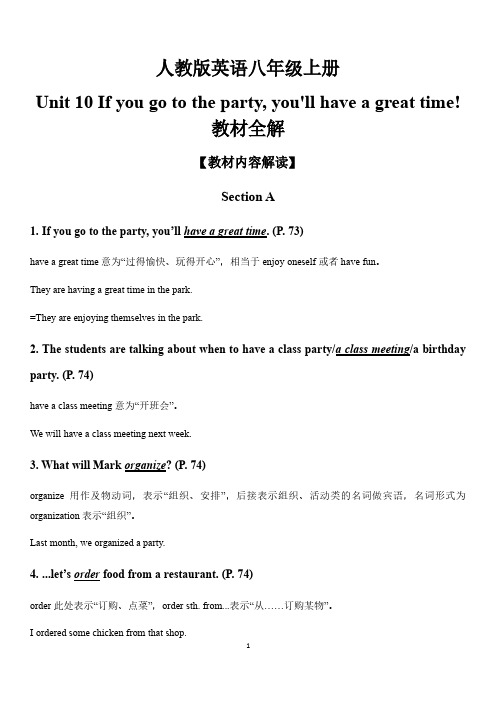
人教版英语八年级上册Unit 10 If you go to the party, you'll have a great time!教材全解【教材内容解读】Section A1.If you go to the party, you’ll have a great time. (P. 73)have a great time意为“过得愉快、玩得开心”,相当于enjoy oneself或者have fun。
They are having a great time in the park.=They are enjoying themselves in the park.2. The students are talking about when to have a class party/a class meeting/a birthday party. (P. 74)have a class meeting意为“开班会”。
We will have a class meeting next week.3. What will Mark organize? (P. 74)organize用作及物动词,表示“组织、安排”,后接表示组织、活动类的名词做宾语,名词形式为organization表示“组织”。
Last month, we organized a party.4....let’s order food from a restaurant. (P. 74)order此处表示“订购、点菜”,order sth. from...表示“从……订购某物”。
I ordered some chicken from that shop.【拓展】order还可以作及物动词,意为“命令”,表示“命令”时,常用于order sb. (not) to do sth.结构中The police ordered him to wait right here.5.If we ask people to bring food, they’ll just bring potato chips and chocolate because they’ll be too lazy to cook. (P. 74)ask sb. to do sth.意为“要求某人做某事”,否定形式为ask sb. not to do sth.“要求某人不要做某事”。
人教版英语八年级上册全册教材全解:人教版英语八年级上册 Unit 2 How often do you exercise 教材全解
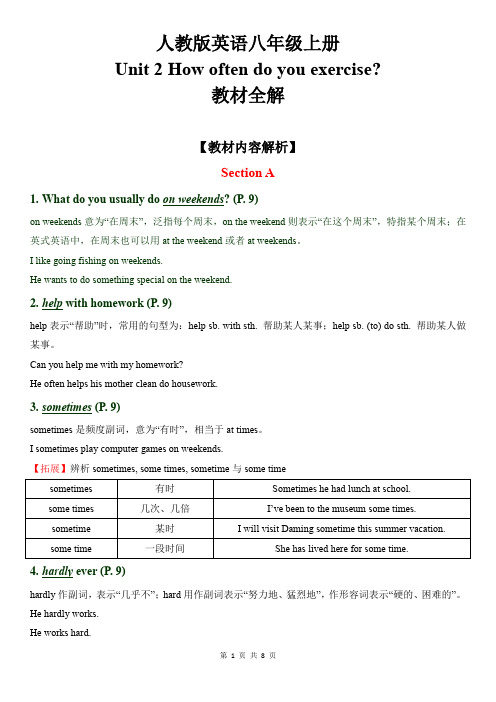
人教版英语八年级上册Unit 2 How often do you exercise?教材全解【教材内容解析】Section A1.What do you usually do on weekends? (P. 9)on weekends意为“在周末”,泛指每个周末,on the weekend则表示“在这个周末”,特指某个周末;在英式英语中,在周末也可以用at the weekend或者at weekends。
I like going fishing on weekends.He wants to do something special on the weekend.2.help with homework (P. 9)help表示“帮助”时,常用的句型为:help sb. with sth. 帮助某人某事;help sb. (to) do sth. 帮助某人做某事。
Can you help me with my homework?He often helps his mother clean do housework.3.sometimes (P. 9)sometimes是频度副词,意为“有时”,相当于at times。
I sometimes play computer games on weekends.【拓展】辨析sometimes, some times, sometime与some time4.hardly ever (P. 9)hardly作副词,表示“几乎不”;hard用作副词表示“努力地、猛烈地”,作形容词表示“硬的、困难的”。
He hardly works.He works hard.This is a hard work.5.How often do you watch TV?(P. 9)how often意为“多久一次”用来提问频率,常用表示频率的副词或者短语来回答,如twice a week, sometimes, every day, always等。
人教版英语八年级上册全册教材全解:人教版英语八年级上册 Unit 7 Will people hav
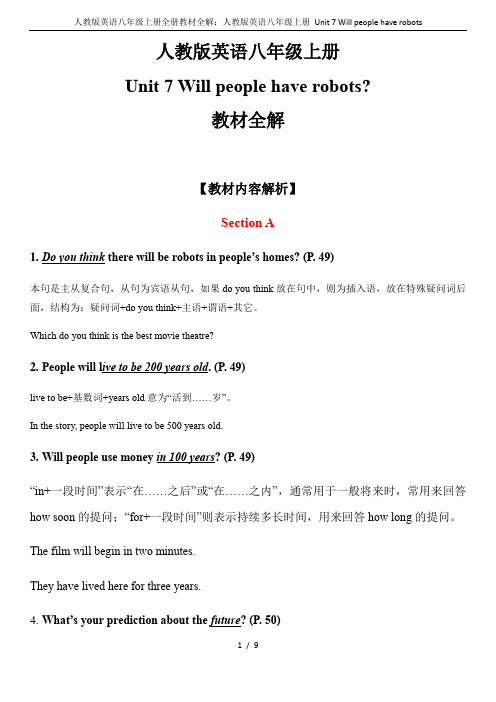
人教版英语八年级上册Unit 7 Will people have robots?教材全解【教材内容解析】Section A1.Do you think there will be robots in people’s homes? (P. 49)本句是主从复合句,从句为宾语从句,如果do you think放在句中,则为插入语,放在特殊疑问词后面,结构为:疑问词+do you think+主语+谓语+其它。
Which do you think is the best movie theatre?2.People will l ive to be 200 years old. (P. 49)live to be+基数词+years old意为“活到……岁”。
In the story, people will live to be 500 years old.3.Will people use money in 100 years? (P. 49)“in+一段时间”表示“在……之后”或“在……之内”,通常用于一般将来时,常用来回答how soon的提问;“for+一段时间”则表示持续多长时间,用来回答how long的提问。
The film will begin in two minutes.They have lived here for three years.4.What’s your prediction about the future?(P. 50)future作名词,表示“将来、未来”,in the future表示“在将来”。
Who knows what will happen in the future.5.I don’t think so.(P. 50)I don’t think so表示“我不这么认为”,肯定形式为I think so。
---Look at the cloud. It is going to rain.---I don’t think so. It will be sunny soon.【拓展】类似的结构还有:I hope so“我希望如此”,I hope not“我希望不是这样”,I’m afraid so“恐怕如此”,I’m afraid not“恐怕不是这样的”。
(完整版)人教版英语八年级上册全册教材全解:人教版英语八年级上册Unit1Wheredidyougoonvacation教材全解
人教版英语八年级上册Unit 1 Where did you go on vacation?教材全解【教材内容解析】Section A1.Where did you go on vacation? (P. 1)on vacation意为“在度假”,结构“on+名词”表示“在某种状态中”。
My family went to Hainan on vacation last year.2....visited my uncle (P. 1)visit此处用作及物动词,后接人或物做宾语,意为“拜访、看望”,后接表示地点的名词,意为“参观、游览”。
I visited my grandmother last week.Do you want to visit Shanghai?3....go with anyone? (P. 2)(1)anyone用作不定代词,意为“有人、任何人”,相当于anybody,用于疑问句和否定句中,在肯定句中用someone或者somebody。
但是anyone也可以用在肯定句中,表示“任何一个人”。
Did you meet anyone friendly in that city?Anyone can be helpful in some way.(2)anyone只能指人,不可以指物,后面不接of短语;any one既可以指人也可以指物,后可接of短语。
Anyone in my class knows any one of the singers and any one of their sons.4....buy anything special? (P. 2)(1)buy用作双宾语动词,表示“买”,常用的结构为“buy sb. sth.”或者“buy sth. for sb.”,表示“为某人买某物”。
My father bought me a bike.=My father bought a bike for me.【拓展】可接双宾语的动词还有give, bring, show, tell, sell等。
【八年级】人教版英语八年级上册全册教材全解Unit10
【关键字】八年级人教版英语八年级上册Unit 10 If you go to the party, you'll have a great time!教材全解【教材内容解析】Section A1.If you go to the party, you’ll have a great time. (P. 73)have a great time意为“过得愉快、玩得开心”,相当于enjoy oneself或者have fun。
They are having a great time in the park.=They are enjoying themselves in the park.2. The students are talking about when to have a class party/a class meeting/a birthday party. (P. 74)have a class meeting意为“开班会”。
We will have a class meeting next week.3. What will Mark organize? (P. 74)organize用作及物动词,表示“组织、安排”,后接表示组织、活动类的名词做宾语,名词形式为organization表示“组织”。
Last month, we organized a party.4....let’s order food from a restaurant. (P. 74)order此处表示“订购、点菜”,order sth. from...表示“从……订购某物”。
I ordered some chicken from that shop.【拓展】order还可以作及物动词,意为“命令”,表示“命令”时,常用于order sb. (not) to do sth.结构中The police ordered him to wait right here.5.If we ask people to bring food, they’ll just bring potato chips and chocolate because they’ll be too lazy to cook. (P. 74) ask sb. to do sth.意为“要求某人做某事”,否定形式为ask sb. not to do sth.“要求某人不要做某事”。
人教版英语八年级上册全册教材全解Unit10
人教版英语八年级上册Unit 10 If you go to the party, you'll have a great time!教材全解【教材内容解析】Section A1.If you go to the party, you’ll have a great time. (P. 73)have a great time意为“过得愉快、玩得高兴”,相当于enjoy oneself或have fun。
They are having a great time in the park.=They are enjoying themselves in the park.2. The students are talking about when to have a class party/a class meeting/a birthday party. (P. 74)have a class meeting意为“开班会”。
We will have a class meeting next week.3. What will Mark organize? (P. 74)organize用作及物动词,表示“组织、安排”,后接表示组织、活动类的名词做宾语,名词形式为organization表示“组织”。
Last month, we organized a party.4....let’s order food from a restaurant. (P. 74)order此处表示“订购、点菜”,order sth. from...表示“从……订购某物”。
I ordered some chicken from that shop.【拓展】order还能够作及物动词,意为“命令”,表示“命令”时,经常使用于order sb. (not) to do sth.结构中The police ordered him to wait right here.5.If we ask people to bring food, they’ll just bring potato chips and chocolate because they’ll be too lazy to cook. (P. 74)ask sb. to do sth.意为“要求某人做某事”,否定形式为ask sb. not to do sth.“要求某人不要做某事”。
人教版英语八年级上册全册教材全解Unit-10
人教版英语八年级上册Unit 10 If you go to the party, you'll have a great time!教材全解【教材内容解析】Section A1.If you go to the party, you’ll have a great time. (P. 73)have a great time意为“过得愉快、玩得开心”,相当于enjoy oneself或者have fun。
They are having a great time in the park.=They are enjoying themselves in the park.2. The students are talking about when to have a class party/a class meeting/a birthday party. (P.74)have a class meeting意为“开班会”。
We will have a class meeting next week.3. What will Mark organize? (P. 74)organize用作及物动词,表示“组织、安排”,后接表示组织、活动类的名词做宾语,名词形式为organization表示“组织”。
Last month, we organized a party.4....let’s order food from a restaurant. (P. 74)order此处表示“订购、点菜”,order sth. from...表示“从……订购某物”。
I ordered some chicken from that shop.【拓展】order还可以作及物动词,意为“命令”,表示“命令”时,常用于order sb. (not) to do sth.结构中The police ordered him to wait right here.5.If we ask people to bring food, they’ll just bring potato chips and chocolate because they’ll be too lazy to cook. (P. 74)ask sb. to do sth.意为“要求某人做某事”,否定形式为ask sb. not to do sth.“要求某人不要做某事”。
- 1、下载文档前请自行甄别文档内容的完整性,平台不提供额外的编辑、内容补充、找答案等附加服务。
- 2、"仅部分预览"的文档,不可在线预览部分如存在完整性等问题,可反馈申请退款(可完整预览的文档不适用该条件!)。
- 3、如文档侵犯您的权益,请联系客服反馈,我们会尽快为您处理(人工客服工作时间:9:00-18:30)。
人教版英语八年级上册Unit 10 If you go to the party, you'll have a greattime!教材全解【教材内容解析】Section A1.If you go to the party, you’ll have a great time. (P. 73)have a great time意为“过得愉快、玩得开心”,相当于enjoy oneself或者have fun。
They are having a great time in the park.=They are enjoying themselves in the park.2. The students are talking about when to have a class party/a class meeting/a birthday party. (P. 74)have a class meeting意为“开班会”。
We will have a class meeting next week.3. What will Mark organize (P. 74)organize用作及物动词,表示“组织、安排”,后接表示组织、活动类的名词做宾语,名词形式为organization表示“组织”。
Last month, we organized a party.4....let’s order food from a restaurant. (P. 74)order此处表示“订购、点菜”,order sth. from...表示“从……订购某物”。
I ordered some chicken from that shop.【拓展】order还可以作及物动词,意为“命令”,表示“命令”时,常用于order sb. (not) to do sth.结构中The police ordered him to wait right here.5.If we ask people to bring food, they’ll just bring potato chips and chocolate because they’ll be too lazy to cook. (P. 74)ask sb. to do sth.意为“要求某人做某事”,否定形式为ask sb. not to do sth.“要求某人不要做某事”。
My parents ask me to take my study seriously.He asked the boys not dig holes on the ground.6.If I go to the party, they will be upset.(P. 75)upset作形容词,意为“难过、失望、沮丧”,be upset with sb.“生某人的气、对某人感到不快”。
She was upset about the way her father treated her.She is upset with me.7.Can you give me some advice please (P. 75)advice是不可数名词,意为“意见、建议”,a piece of advice表示“一条建议”。
I will give you some advice on how to take care of your pet dog.[拓展]1.advice的常用搭配:advice on关于……的建议ask for advice 征求建议follow/take sb’s advice 接受某人的建议2.advise作动词,表示“建议”,常用于以下两种结构中:advise doing sth.建议做某事;advise sb. to do sth. 建议某人做某事。
例如:My mother advised starting off earlier.I advised him to stop smoking.Section B1.If people have problems, they should keep them to themselves. (P. 77) keep...to oneself意为“保守秘密、把问题/烦恼埋在心底”。
I promise to keep it to myself.The teenagers like to keep their problems to themselves.2.“Problems and worries are normal in life,” says Laura. (P. 77)normal用作形容词,表示“正常的、一般的”,副词形式为normally。
It’s normal to feel n ervous before an exam.We normally plant trees in spring.3.Unless we talk to someone, we’ll certainly feel worse. (P. 77)unless用作连词,意为“除非、如果不”,相当于if not,引导条件状语从句,主句用一般将来时,从句用一般现在时代替一般将来时。
Unless he invites me, I won’t go to his party.=If he doesn’t invite me , I won’t go to his party.4.She was afraid to tell her parents about it. (P. 77)be afraid to do sth. 意为“胆小不敢做某事”。
He was afraid to go out at night.【拓展】be afraid of意为“害怕、不敢”,后接名词、代词或者动名词;be afraid that...意为“担心、害怕”。
She is afraid of snakes.I was afraid of going through the woods.He was afraid that he would lose.5.If I tell my parents, they’ll be angry! (P. 77)①be angry with sb.“生某人的气”The wife was still angry with her husband.② be angry abo ut/at sth.“因某事而生气”The teacher was angry at the silly mistakes the students made in the exam.6.Her dad said that he sometimes made careless mistakes himself. (P. 77) mistake用作可数名词,表示“错误、失误”,复数形式为mistakes,常用的短语为:make mistakes/make a mistake“犯错误”,by mistake“错误地、无意中”。
You should be more careful so that you won’t make mistakes.7.They got her a new wallet and asked her to be more careful. (P. 77) careful用作形容词,表示“小心的、慎重的”,常用的结构为:be careful about/with“当心、留意”;be careful to do sth.“当心做某事”。
You must be careful about your spelling.He is careful to read every word.8.Robert Hunt advises students about common problems. (P. 77)advise sb. on/about...“关于……给某人忠告/建议”。
The teachers advise students about study.【拓展】advise作动词,表示“建议”,常用于以下两种结构中:advise doing sth.建议做某事;advise sb. to do sth. 建议某人做某事。
My mother advised starting off earlier.I advised him to stop smoking.9.It is best not to run away from our problems.(P. 77)(1)It is best (not) to do sth.意为“最好(不要)做某事”,it为形式主语,动词不定式才是真正的主语,相当于you’d better (not) do sth.。
It is best to speak English every day.=You’d better speak English every day.(2)run away from“逃避、回避”。
You can not run away from your responsibilities.10.We should always try to solve them. (P. 77)solve表示“解决”,常与problem连用,表示解决难度较大的问题,answer表示“回答、回复”,常与question连用,表示回答常见的问题。
Money ca n’t solve all the problems.Who can answer my questions.11.He thinks the first step to is to find someone you trust to talk to.(P.77)(1)step用作可数名词,意为“步、步骤”。
Please move two steps.Can you tell me the next step(2)trust用作及物动词,表示“相信、信任”,后接名词或者代词做宾语,trust sb. (not) to do sth.“相信某人(不)会做某事”。
You can trust me not to tell anyone else.12.Students often forget that their parents have more experience...(P. 77) experience此处用作不可数名词,意为“经验”。
